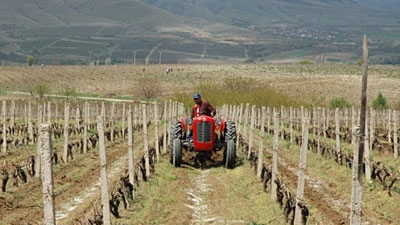Climate change is already underway in the Europe and Central Asia region and it is accelerating, reinforcing the need for immediate, medium-, and long-term solutions which can help everyone involved in agriculture to reduce its adverse impacts. Changes in precipitation patterns, rising temperatures, and increases in the frequency and severity of natural disasters are forcing people to address these impacts in new and innovative ways and begin adapting to a changing climate. While these changes in climate and their resulting effects on agriculture will have an impact on the global population at large, it is the rural populations who are most vulnerable.
A new book on the impacts of climate change on agriculture in the Europe and Central Asia region incorporates the climate smart approach in agricultural development in the region. Looking Beyond the Horizon: How Climate Change Impacts and Adaptation Responses Will Reshape Agriculture in Eastern Europe and Central Asia examines the challenges and opportunities being created in the agriculture sector in Albania, the Former Yugoslav Republic (FYR) of Macedonia, Moldova, and Uzbekistan. Through economy-wide modeling of water supply and demand, the analysis found that, in many cases, water availability for irrigation will be severely curtailed by climate change. This will greatly exacerbate the effects of climate change on crops — especially irrigated crops — with potential yield reductions of 20–50 percent by 2050.
The book also offers countries practical advice on how to help their agricultural sectors adapt to shifts in climate, in a combined effort to both decrease the vulnerability of farmers to climate variability and bolster their ability to capitalize on potential gains presented by a changing climate.
"The adverse impacts of a changing climate are going to have serious effects in agriculture and water sectors," says William Sutton, lead author of the report. "This would have an impact on food security, nutrition, and rural livelihoods."
The findings in this book are already shaping policy in Albania, FYR Macedonia, Moldova, and Uzbekistan. Based on its recommendations, the Government of Albania is implementing a new irrigation and drainage project. FYR Macedonia has incorporated elements from this work into their new Country Partnership Strategy. Moldova is integrating elements of this report into their disaster risk mitigation and adaptation project, and Uzbekistan is piloting a series of recommendations from this work.
Furthermore, efforts are currently underway in Armenia, Azerbaijan, and Georgia to replicate the successes from this project and build a similar series of analyses and recommendations for those countries.
By supporting climate smart agriculture and implementing measures that improve agricultural production, reduce emissions, and increase resilience to climate change, the farming sector in the region is making strides towards ensuring agricultural sustainability in the decades to come.






